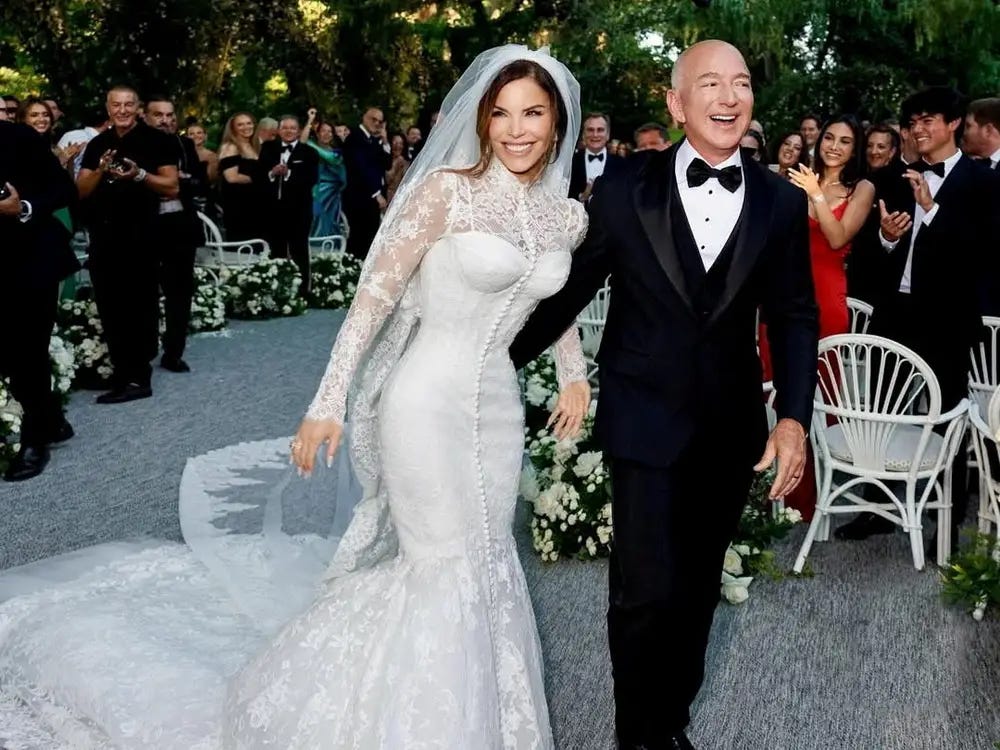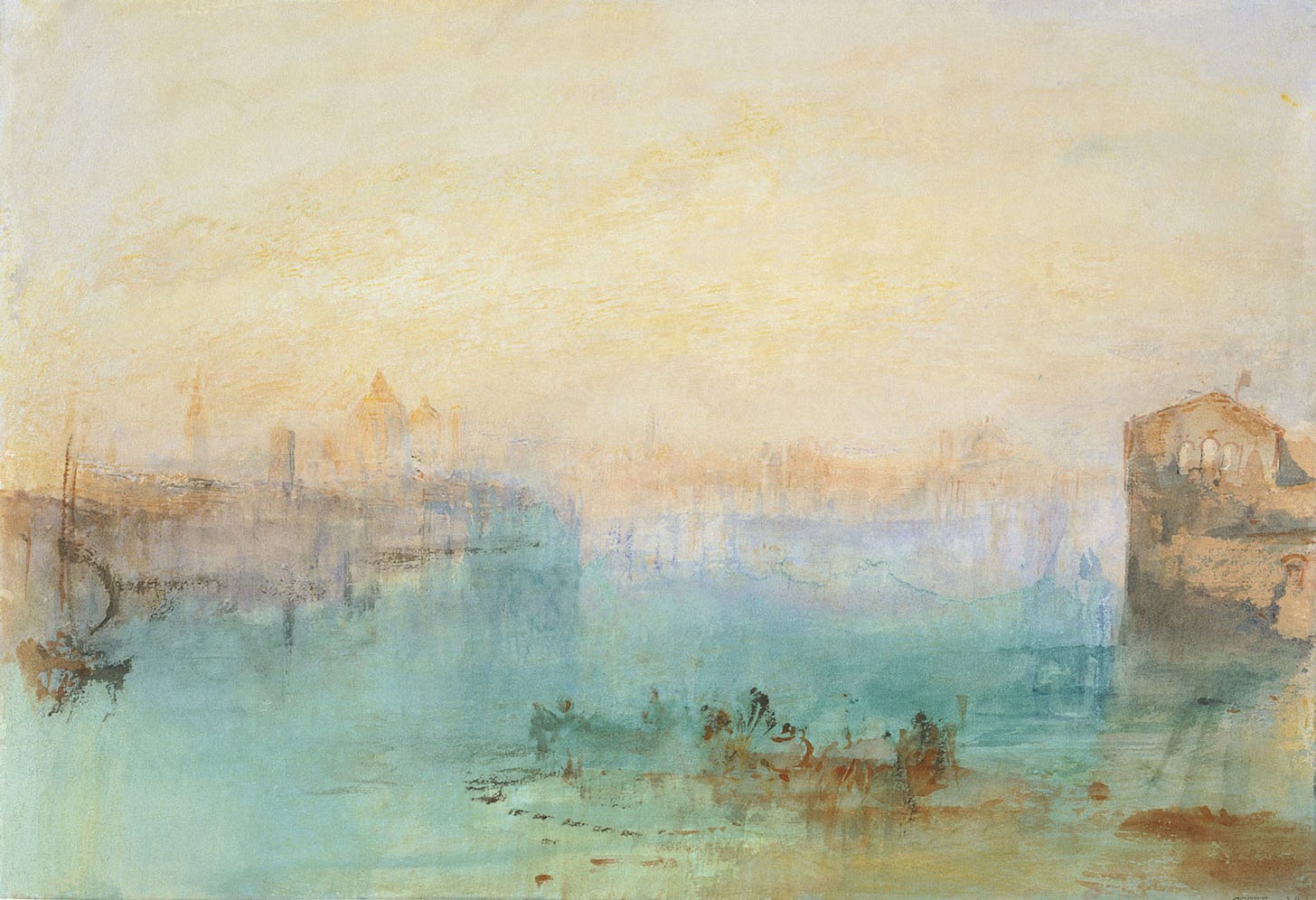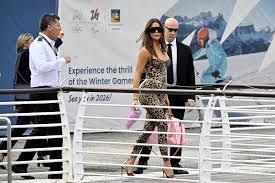Pleonexia in Venice
I don’t know any Kardashians or Jenners but the wedding of the millennium gave me the opportunity to drop a lot of names.
A Merchant in Venice
The great Al Read got one of his characters to remark: “There was enough said at our Edie’s wedding.” Al Read was a rich man because of processed meat. He claimed to have come from a long line of sausages but he was not rich in the Bezos league.
I have been keeping quiet about Jeff Bezos’s nuptials, as plenty of people have had plenty to say.
I stopped buying anything from the Amazon mothership a long time ago, and cancelled my Prime membership. I still had an Audible account and I have been listening to Moby Dick as I do my hour’s walk of a morning. If I exercised my brain as well as my legs, I could probably get some Bezos-adjacent aperçus about the Leviathan of capitalism from this magnificently strange and wondrous book.
It was not easy to cancel my Audible subscription. As always happens when I try to make personal contact with any part of the Amazon cosmocracy, I got caught up in a loop and ended up very frustrated, back where I started. I left it for a day and then the cancellation worked. I was surprised to be asked at the end of the process why I was cancelling. I said it was because of the Bezos wedding.
Venice in History
A resolution of the Venetian senate in 1535 stated: “Our ancestors have always striven to provide this city with the most beautiful temples, private buildings and spacious squares, so that from a wild an uncultivable refuge it has grown, been adorned and constructed, so as to become the most illustrious city which at present exsts in the world.”
In AD 537, a Roman observer wrote: “They have an abundance only of fish. Rich and poor live together in equality. The same food and similar houses are shared by all, wherefore they cannot envy each other’s hearths and so they are free from the vices that rule the world.”
Felipe Fernández-Armesto writes “Venice was an anachronism, which her citizens and subjects paid heavily to defend. Although the rulers of the republic were all merchants – capitalist entrepreneurs, devoted to the accumulation of profit – they kept up, almost for the whole of Venetian history, unrelenting moral pressure on each other to put the interests of the state first. Much of Venetian art is dedicated to this collective ideal and to celebrating the contributions of the various noble families.”
The city was started when the early inhabitants, perched like waterfowl, built wooden huts on stilts, gradually piling mud from the lagoon on top of the unstable little islands to provide a platform for more substantial edifices. The whole city still rests on stilts on sand with trunks of pine and oak driven down twenty-five feet into compressed sand and clay. Fernández-Armesto writes: “… the bravado of the builders now looks increasingly foolhardy, as the environment takes its revenge, and, sagging under the weight of its heritage, corroded by a polluted sea, Venice struggles to stay above the waves.”
Πλεονεξία
Pleonexia, originating from the Greek πλεονεξία, is a philosophical concept which roughly corresponds to greed, covetousness, or avarice, and is strictly defined as "the insatiable desire to have what rightfully belongs to others." It is a hunger that can never be sated. It feeds on itself. The more you get the more you need. Plato related pleonexia to justice. Aristotle, in his Nicomachean Ethics, argued that all specifically unjust actions are motivated by pleonexia. Thomas Hobbes includes pleonexia as a concept of natural law in Leviathan: “The observers of this law, are those we call Modest, and the breakers Arrogant Men. The Greeks call the violation of this law πλεονεξία; that is, a desire of more than their share.” There were many arrogant and immodest people in Venice the other day.
William Barclay describes pleonexia as an "accursed love of having", which "will pursue its own interests with complete disregard for the rights of others, and even for the considerations of common humanity". He labels it an aggressive vice that operates in three spheres of life. In the material sphere, it involves "grasping at money and goods, regardless of honour and honesty". In the ethical sphere it is "the ambition which tramples on others to gain something which is not properly meant for it". In the moral sphere, it is "the unbridled lust which takes its pleasure where it has no right to take".
I am not the Ahab to take on the Amazon leviathan but am I part of a trend here? The Guardian reported from Venice on a woman from Northern Spain who said, “It’s grotesque. Two hundred and fifty guests and a bill of €50m? This is why I don’t buy anything on Amazon.” Public disgust at the crazed antics of the billionaire barbarians seems to be growing. Sales of the Ketomaniac Musk’s cars have declined rapidly.
The guests were a rent-a-mob who turn up for everything where there is free food and drink and cameras. Are they really friends of the happy couple? I wouldn’t want them at my wedding - or funeral. Do they really not comprehend how foolish they look and how much people despise them?
The phrase “you can’t take it with you” is familiar and accepted by most sane, normal people. Most people struggle to manage on what they have and still help others out. The likes of Jeff and Lauren seem to think, like the Pharaohs of old, that they CAN take it with them and if they can’t they will spaff it all in a orgy of bling. Other absurdly rich people like Warren Buffett and Bill Gates have specifically expressed their intention to give it all away before they leave us. “The proceeds from all of my Berkshire shares will be expended for philanthropic purposes by 10 years after my estate is settled. Nothing will go to endowments; I want the money spent on current needs.” Buffett wrote: “Too often, a vast collection of possessions ends up possessing its owner. The asset I most value, aside from health, is interesting, diverse, and long-standing friends.” I am following Warren’s example and giving away all my capital and possessions. Is the world ready? Bill Gates plans to give away most of his $200 billion by 2045 through the Bill & Melinda Gates Foundation. He has pledged to donate 99% of his fortune and aims to close the foundation in 2045.
Howard Jacobson coined the phrase, “Philanthropy – the last resort of the scoundrel.” This was in the context of Jimmy Savile. Whatever about that, Gates and Buffett, like Andrew Carnegie before them, seem to have had a positive impact on the lives of many people. Most billionaires seem to have had a detrimental effect on the world.
In the interest of balance and fairness I must record that Bezos has publicly stated his intention to give away most of his wealth during his lifetime. He has pledged to donate the money to fighting climate change and reducing inequality. He could start by … oh, I don’t need to go on, do I?
Tradesman’s Entrance
Much of the commentary about the “intimate 200-person ceremony” has focused on resentment of the 50,000 people who actually live in Venice that their home town is a theme park for tourists. I have travelled quite a bit and have always been disappointed that a place that I knew in my dreams – St Marks Square, the Taj Mahal, Macchu Picchu, the British Museum, the Tate Gallery – has in real life other people in it apart from me. These people stare at me and get in my way. I always imagined myself alone in such places. I have been much happier shivering in a tent in the High Atlas with a gang of Berbers or breathing in the fragrance of incence and yak shit at Tengboche Monastery at 3,867 metres up in the Khumbu region. The invasion of Venice has been going on for a long time. I wrote about it over ten years ago, but Henry James, John Ruskin and Marcel Proust were writing about it in the 19th and early 20th Centuries.
https://pcolman.wordpress.com/2014/04/18/venice-and-death/
Tommaso Cacciari, a Venetian activist and a leader of the No Space for Bezos movement, said, "He wanted to use Venice as a background. We used him to speak about the real problems of Venice, and it worked. Given the persistent problems of overtourism and the high cost of living, locals see the opulence of the wedding as a little bit crass."
The reportedly $50m wedding (which won’t make a dent in Bezos’ estimated $237 billion fortune) booked all nine of Venice’s yacht ports, closed parts of the city to the public and forced the relocation of hotel guests to make room for the blessed couple. Bezos gets his wealth from exploiting labour in non-unionised facilities. Amazon does not pay its fair share in taxes. Bezos brown noses Trump. Amazon is detrimental to the environment. In Venice a banner read: “If you can rent Venice for your wedding you can pay more tax.” Wedding guests arrived on 96 private jets. Kylie Jenner’s single private jet trip produced as much CO₂ as a gasoline car driving three times around the world. In just a few hours, she used up the electricity-related carbon budget of three households for an entire year.
If you want to know who the 200 intimate friends were who attended the wedding check this out:
https://www.today.com/popculture/news/jeff-bezos-lauren-sanchez-wedding-guest-list-rcna215217
I will understand if you don’t want to.
Marriage Hearse
But most thro’ midnight streets I hear
How the youthful Harlots curse
Blasts the new-born Infants tear
And blights with plagues the Marriage hearse.
Blake uses the phrase "marriage hearse" to create a jarring contrast between the positive connotations of marriage and the negative image of a hearse. The "marriage hearse" symbolises how marriage, especially for women, could be a restrictive and even fatalistic institution, potentially leading to suffering and despair.
The poem exposes the social conditions of London, particularly the exploitation of women and the spread of disease. The phrase "harlot's curse" in the poem refers to the spread of sexually transmitted diseases, which Blake links to the institution of marriage and its negative consequences. The poem suggests that these diseases can turn a marriage into a "marriage hearse".
Did we see a Marriage Hearse in Venice? Even if the marriage turns sour, the lovely bride will not be forced into penury. Penury is mightier than the sword.
Venice Desired
The brilliant Tony Tanner’s last book, Venice Desired, published in 1992, before he died of cancer at the age of 63, was an imaginative and stimulating examination of how Venice has appeared to a number of writers: Lord Byron, John Ruskin, Henry James, Hugo von Hofmannsthal, Marcel Proust and Ezra Pound. “The general point here is that Venice is not really ever written about from the inside, but variously appropriated from without.” He continues: “In decay and decline (particularly in decay and decline), falling or sinking to ruins and fragments, yet saturated with secretive sexuality, thus emanating or suggesting a heady compound of death and desire…”
Tanner writes, while considering Byron: “…a vaporised and de-substantiated ‘Venice’ has been purveyed by thousands of empty texts and pictures from the end of the eighteenth century to the present day.” The Venice Byron describes in Canto IV of Childe Harold is seen from an “airy distance”. Turner painted Venice “dissolving and disappearing into a glorious cataclysm of light…”. Tanner writes: “The perpetual architecture is perpetually dissolving into the perpetual fluidity.”
Tanner mentions many other writers who have visited or had thoughts about Venice. Shakespeare, “Monk” Lewis, Thomas Otway, Mrs Radcliffe. Goethe, Madame de Staël, Robert Browning, DH Lawrence, Thomas Mann, Rainer Maria Rilke, Nathaniel Hawthorne, Herman Melville, Edgar Allan Poe (only in his imagination), Mark Twain, WB Yeats, Jean Paul Sartre. Emerson described Venice as “a great oddity, a city for beavers… a most disagreeable residence.”
Browning gave these words to Don Juan:
what I took of late
For Venice was the world; its Carnival- the state
Of mankind, masquerade in life-long permanence
For all time, and no one particular feast day.
One feast celebrated in Venice every year on the Sunday after Ascension Day was the marriage of Venice to the Adriatic. The Doge (nothing to do with Elon Musk) would ride in the Bucentaur, his magnificent state barge, and cast a wedding ring into the water.
Malcolm Kensall writing about Venetian drama said, “The issue they face is the resistance against the corruption of their own class…”“…in addition to being a powerful and enormously rich republic, Venice was effectively a police state with its notorious secret tribunals…”
John Ruskin
Ruskin, according to Tanner, explained the rot in Venice as a result of “over luxuriance, over refinement, jaded faculties, intemperance in moral habits, satiety, search for morbid excitement, voluptuousness, feebleness and want of soul.” I wonder what Ruskin would have made of the Kardashians. Ruskin in his own words: “That ancient curse was upon her, the curse of the Cities of the Plain, ‘Pride, fulness of bread, and abundance of idleness’. By the inner burning of her own passions, as fatal as the fiery rain of Gomorrah, she was consumed from her place among the nations, and her ashes are choking the channels of the dead, salt sea.”
Henry James
Tanner on Henry James: “The ontological displacement – or embarrassment – induced by the sheer spectacle of Venice constantly manifests itself in this uneasy oscillation between feeling a mere vulgar tourist and a none the less impassioned observer.” James takes issue with Ruskin: “Instead of a garden of delight, he (Ruskin) finds a kind of assize court in perpetual session. Instead of a place in which human responsibilities are lightened and suspended he finds a region governed by a mind of Draconian legislation.”
Not that James would have approved of the “garden of delight” concocted by the concatenation of cunts brought to Venice by Bezos. James wrote: “The misery of Venice is there for all to see. It is part of the spectacle … The Venetian people have little to call their own – little more than the bare privilege of leading their lives in the most beautiful of towns. Their habitations are decayed; their taxes heavy; their pockets light; their opportunities few.” James directs his anger at the “herds” of tourists who “infest” the city. “The barbarians are in full possession and you tremble for what they may do. You are reminded from the moment of your arrival that Venice scarcely exists any more as a city at all; that she exists only as a battered peep-show and bazaar.”
Venice features in James’s novel The Aspern Papers, published in 1888. His unnamed narrator has come to Venice in search of letters from Jeffrey Aspern, a famous and now dead American poet. Tony Tanner writes this about the novel: “And into this city James is introducing an American in the grip of a ‘fixed idea’ or ‘monomania’ which makes him, self-avowedly, ruthless and predatory. In the process he displays a patriotism which is touched with crassness, and a misogyny tending to gracelessness. The irritated contempt with which he speaks of both Europe and women masks, one can only infer, a fear and apprehension of both.” Beautiful words are “pressed into service to conceal or mask the ‘shabby’ realities of motive and manoeuvres which are at work.”
Graceless, crass Americans who are ruthless in the grip of predatory monomania and misogyny. Remind you of anyone?
Listen to Lorenzo in Shakespeare’s Merchant of Venice:
The man that hath no music in himself,
Nor is not moved with concord of sweet sounds,
Is fit for treasons, stratagems and spoils.
The motions of his spirit are dull as night
And his affections dark as Erebus.
Let no such man be trusted.
Watch Trump “dancing” to the music of The Village People.
Hugo von Hofmannsthal
Herman Broch wrote, in a discussion of Hugo von Hofmannsthal’s essays, that it seems: “…incomprehensible that Venice was once upon a time actually built by pile sinkers, masons, and roofers; does not Venice likewise possess a spiritual existence created and protected by nature? The artificial flows into the natural, the natural in turn into the artificial, and whether on the stage or in so-called life, the planes of reality cut across one another, with the result that man constantly wanders between changing dream sceneries, whose origins are in an anonymous Somewhere but are nevertheless created by man himself. His ego has been discarded, yet he recognises it everywhere, man’s reality lies in the anonymous, and whatever he creates only becomes real when he, like the folk artist, has been submerged in anonymity, returned to the natural, stripped of everything homunculoid and led to the rediscovery of his shadow.”
Andreas is an unfinished, posthumously published novel by Hugo von Hofmannsthal. In writing about the novel, Herman Broch evokes the sinister atmosphere of Venice captured in Nicolas Roeg’s film Don’t Look Now. “Here in the never ending maze of alleys and canals, a reflected image of every intrigue, every possible human entanglement, he gets caught in a net of reflections and counter-reflections, in a thicket of psychic identifications and antagonisms, in a spiritual masquerade packed with erotic depths and superficialities. Into what kind of watertown filled with beauty and mud had fate brought him? It is salt water, yet not sea - could the life voyage, youth and age seemingly blended, be coming so soon to an end in this glitter of threatening ambiguity?”
Haves and Have Yachts
I watched on the Daily Beast podcast Evan Osnos talking about his new book on the super rich., Haves and Have Yachts. Jeff Bezos commissioned a $485m yacht called Koru. The boat was too tall to pass under Rotterdam’s Koningshaven Bridge, and when its manufacturers suggested dismantling the bridge, rather than the yacht, the Dutch refused.
Boat International defines a superyacht as "a luxury, privately-owned yacht that measures 24 metres or more in length, and is professionally crewed". 1,024 new superyachts were built or on order around the world in 2022, a 25% jump from 2021, and a then all-time high, according to Boat International's figures. This then increased to 1,203 in 2023, another new record. You can pay €36m ($41m; £30m) for a new smaller boat, up to €295m for a 105m-long vessel with all the optional extras. Today's superyachts have everything from helipads to cinemas, gyms, beauty salons, and saunas. Sometimes, these facilities are towed behind on a separate mini-me yacht.
Yachts have become a symbol of the corruption of the obscenely super rich but JD Vance uses some convoluted thinking to see yachts as a symbol of Ukrainian corruption. “There are people who would cut Social Security, throw our grandparents into poverty. Why? So that one of Zelenskyy’s ministers can buy a bigger yacht?” July 4 2025 was celebrated by Vance and Trump cutting medical services and throwing America grannies into poverty to benefit the Bezoses of this world.
Greed is not good, even for the greedy.
Masks and Venice
Browning wrote of “masquerade in life-long permanence”. Masks are part of the Venetian tradition. The masks are the symbol of freedom and transgression, they level social categories and add charm (there are exceptions) and mystery to the wearer. Stanley Kubrick's final film, Eyes Wide Shut, although set in New York, heavily features Venetian masks, which play a significant role in the film's atmosphere and thematic exploration of secrets, social roles, and hidden desires. The masks, particularly those from the Venetian Carnival, are used to symbolise both the allure and the duplicity of appearances. The masked orgy sequence is a key example of how Kubrick uses masks to create a sense of otherworldliness and to explore themes of social hierarchy, hidden desires, and the potential dangers of unchecked power.
Penetration
Writers often personify Venice as a woman and often talk of “penetration”. Penetration, that’s the name of the game and each generation they play the same. I am surprised that The Great Penetrator himself was not at the Big Beautiful Wedding in Beautiful Venice.
Marcel Proust visited Venice with his mother at a time when he was still interested in women as sexual partners. Tony Tanner writes: “Not being able to tell where the land finishes and the water begins is of a piece with larger epistemological, even metaphysical, uncertainties and doubts about boundaries. Venice becomes supremely the place where seemingly distinct categories can leak, or indeed soak, into each other – carnival again, but this time a carnival of the mind and senses. For Proust, it will become the place where he can’t tell where Time finishes and Eternity begins.”
“If Albertine had not been up there, and indeed if I had merely been in search of pleasure, I would have gone to demand it of unknown women, into whose life I should have attempted to penetrate, in Venice perhaps.”
Tanner notes the physicality of Proust’s vocabulary: “Grapple, wrestle, invade, penetrate – there is something distinctly erotic in the way Proust conceived of the past suddenly seeming to seduce and insinuate, even thrust itself into the present. Always to be vanquished, but, in being so, always more beautiful.”
When Proust is left alone in Venice, the city turns, according to Tanner, ”into a site of contraction, divestment, extinction. The place where meanings and values drain away; a place of disassociation and alienation. Venice is the place where he loses the idea of Venice, and all he is left with is the mute unmeaning ‘material elements’ – the stones.”
Rape by Tourism
George Monbiot wrote: “Tourism extracts the differences between ourselves and other people”. Tourism is an extractive industry and not much of its benefits go to locals. Resorts are usually operated by foreign companies. Any local benefits that do accrue must be offset against the downside – such as the commandeering of scarce, clean, fresh water by resorts to the detriment of local communities.
Don Delillo wrote in his novel, The Names:
“To be a tourist is to escape accountability. Errors and failings don't cling to you the way they do back home. You're able to drift across continents and languages, suspending the operation of sound thought. Tourism is the march of stupidity. You're expected to be stupid. The entire mechanism of the host country is geared to travelers acting stupidly. You walk around dazed, squinting into fold-out maps. You don't know how to talk to people, how to get anywhere, what the money means, what time it is, what to eat or how to eat it. Being stupid is the pattern, the level and the norm. You can exist on this level for weeks and months without reprimand or dire consequence. Together with thousands, you are granted immunities and broad freedoms. You are an army of fools, wearing bright polyesters, riding camels, taking pictures of each other, haggard, dysenteric, thirsty. There is nothing to think about but the next shapeless event.”
Today people wander around in a stupor staring into phones.
I wrote this poem many years ago.
Hotels are Whores
Can Visa buy you love?
Some places you can rent
A virgin
For the price of a bottle of beer.
Surely to God,
Money can buy you pamperation
And escape from reality.
Luxury and room service.
Fifty-seven channels of limitless
Possibility and fantasy.
Succulent food
And expensive wine
Brought to your bed.
Gushing hot
And cold water
In the middle of a desert.
Deluded away from
Reality,
You don’t need
To lift a finger,
As long as you have that card.
No come-back.
You won’t be returning.
But wait.
You are not the first penetrant of this space.
A long alien hair
In the bath tub.
Dubious stains
On toilet and towels.
A toe-nail clipping
On the carpet.
A razor blade
In the bidet.
This is not territory that
Is virginal.
First complaint will bring unctuous smiles.
Persistent complaints will only
Bring beating or sacking
Of migrant minions
Domiciled
Three bus trips
From the hotel.
Your bubble bursts
Leaking blood.
You lie, spent,
But
Not sated.
Back home, infected, in
Mundanesville,
Your house is clogged
With bills waiting to be paid.
Flies are on the cadavers
You left behind.
Crows pick
At the corneas.
In the real world
You wade through
A mire of responsibilities,
Of consequences,
Old chum.











